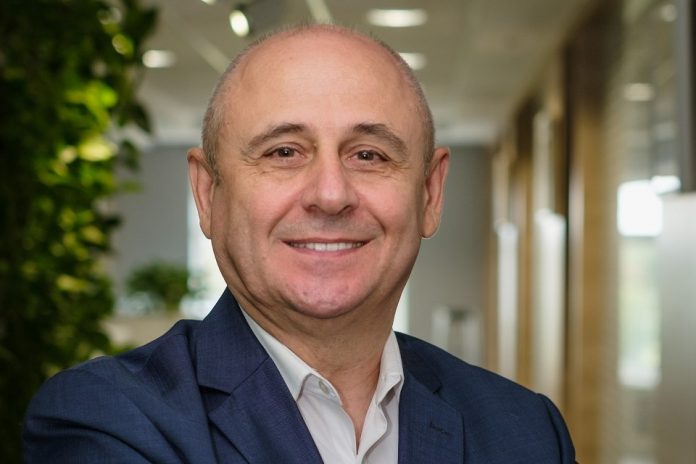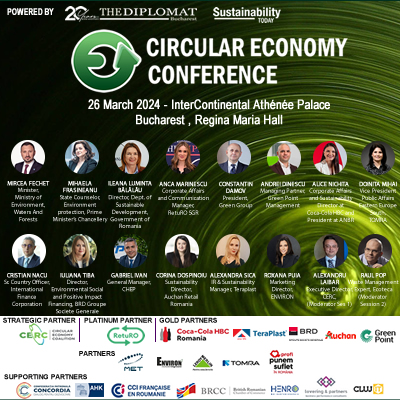“Like most companies in Romania, GreenGroup is currently experiencing difficulties in securing the labour force, being on the verge of importing labour from Asia. At the same time, the ever-increasing prices for electricity and gas affect us, but especially the uncertainty of access to them soon (we are talking here about the possibility of disconnection, at critical moments, during the winter period),” Constantin Damov, president of GreenGroup told The Diplomat-Bucharest.
“We seek to strengthen the existing activities through re-technology, up to the level of artificial intelligence, as well as by diversifying the types of recycled waste (textiles, construction & demolition, flexible packaging, etc.). At the same time, we are considering increasing our presence in Central and Eastern Europe, through investments in new capacities, but also through acquisitions of companies in the recycling industry. We want GreenGroup’s regional presence to create a geographical arc starting from the Baltic countries and ending in the Southern Balkans. We believe that this is not only possible, but also necessary, given the considerable lagging behind of this European area in terms of the collection and recovery of waste from the perspective of the circular economy.”
How was the Green Group’s activity affected by the start of the war?
The start of the war did not affect us in terms of the sales market or the supply lines, with GreenGroup operating in a proportion of over 90 percent in the European Union market. Neither Ukraine nor Russia were present as major markets, resulting in minimal commercial impact. However, ever-increasing energy prices are reflected in production costs, and further, of course, in the final price to customers.
What is the impact of supply chain problems?
The logistic chains, in our case, are short, the market we operate in being the European one. As a regional player, we have been affected to a lesser extent by the logistical issues raised. I could even say that the positioning we have in this context creates a small advantage for us. And that is because, both in supply and in delivery, the means of transport used is road and we can ensure deliveries in a maximum of 48 hours. Thus, we are less affected on the logistic chain compared to global players using sea transport (containers), where prices have increased by 8-10 times and delivery times exceed 90 days.
How have rising energy and natural gas prices affected you?
The increase in electricity and natural gas prices had a direct and immediate impact on production costs. Their transfer in the price of our products meets constant resistance from customers, for fear of generating an inflationary effect in the chain, by increasing the price of the final product (an example is the automotive industry).
On the other hand, during the logistics crisis, combined with the ever-higher price of oil, there is also a good side for us, that all industries show an increased interest in recycled raw materials. This is because the recycled materials used in the production processes come with a reduction in energy consumption between 50 and 90 percent, compared to virgin (new) materials. Example: up to 50 percent discount on glass, over 90 percent on aluminium and 70 percent on PET etc.
What are the key issues facing GreenGroup?
Like most companies in Romania, GreenGroup is currently experiencing difficulties in securing the labour force, being on the verge of importing labour from Asia.
At the same time, the ever-increasing prices for electricity and gas affect us, but especially the uncertainty of access to them soon (we are talking here about the possibility of disconnection, at critical moments, during the winter period).
In addition, since our sources of supply are exclusively post-consumer waste, we suffer from the extremely mediocre performance of municipal collection, which places Romania today in the penultimate place in the European Union. To counter this, GreenGroup is still resorting to supplementary imports with sorted waste from the other member states.
Which companies in the group performed best in the first part of the year?
All companies performed well, demonstrating resilience even in the current conditions. In the area of plastic recycling, we have the only threats, one explanation being that the need for plastic (PET packaging) comes, as I said earlier, from imports.
These results reinforce our belief that the circular economy, the model adopted and practiced by GreenGroup, represents a solution to all the crises we have talked about so far. We are talking here about the use of locally generated post-consumer waste as renewable resources for industrial production.
What are the investment projects this year?
Backed by Abris Capital Partners, whose portfolio includes GreenGroup, this year we accessed a 127-million-euro loan to accelerate our expansion in Central and Eastern Europe and strengthen our position as an important player in the circular economy, aiming for an ambitious M&A strategy.
The first step was to launch the Circular Innovations division, which will invest in start-up or scale-up companies in the circular economy. The first acquisition from the division was SIGAD, a Romanian developer of environmental reporting software, through which we marked a new stage of growth for GreenGroup, focusing on unique businesses with a technological profile or that contribute to the objectives of resource efficiency and reduction of carbon dioxide emissions globally.
UAB Ecso, a Lithuanian low-density polyethylene (LDPE) recycling company, was the second recent transaction by GreenGroup and a decisive step in our strategy to become a key player in the region in polyolefin recycling. This is the second investment we have made in the Lithuanian market so far, managing to create a successful model here for the closed-loop recovery of plastic resources (PET and polyolefins), which we want to scale up in other countries.
In all these industrial development projects there is the need and urgency to become as self-sufficient as possible in terms of electricity and gas, and we have proposed to produce electricity and thermal energy in a decentralized manner and from renewable sources (biomass, photovoltaic energy).
What is the group’s medium-term development strategy?
We seek to strengthen the existing activities through re-technology, up to the level of artificial intelligence, as well as by diversifying the types of recycled waste (textiles, construction & demolition, flexible packaging, etc.). At the same time, we are considering increasing our presence in Central and Eastern Europe, through investments in new capacities, but also through acquisitions of companies in the recycling industry. We want GreenGroup’s regional presence to create a geographical arc starting from the Baltic countries and ending in the Southern Balkans. We believe that this is not only possible, but also necessary, given the considerable lagging behind of this European area in terms of the collection and recovery of waste from the perspective of the circular economy.
An advantage of GreenGroup is that it benefits from strong support from Abris Capital Partners, which is an enthusiastic investor in sustainability, proposing that all this development be conducted with a zero-carbon footprint.




